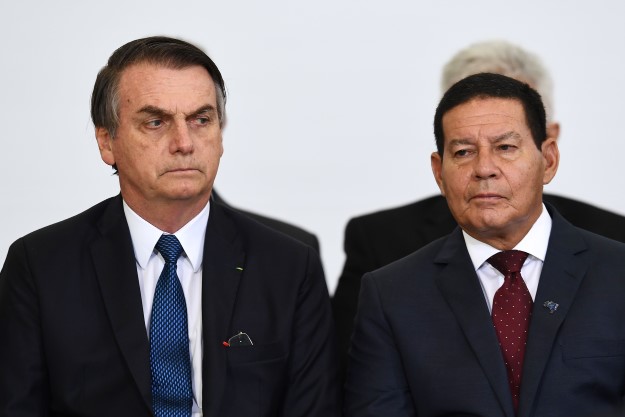BY OLIVER STUENKEL | APRIL 18, 2019
With the opposition in disarray, Hamilton Mourão has become Bolsonaro’s top opponent.
After a little over one hundred days in power, President Jair Bolsonaro’s government is at war with itself, and the president is increasingly unable to control the factions close to him jockeying for influence. Amid the chaos – and with a disorganized opposition — an unexpected figure is working to keep the president in check: Hamilton Mourão, Bolsonaro’s own vice president.
Mourão has emerged as the leader of the generals in Bolsonaro’s administration, a role that’s put him at odds with Olavo de Carvalho, the Virginia-based conspiracy theorist and influential voice of the anti-globalist wing of Bolsonaro’s government. The anti-globalists are also regularly clashing with a third faction, the neoliberal economists around Economy Minister Paulo Guedes and the technocrats such as Justice Minister Sérgio Moro. The president is stuck in the middle of these three groups that helped him get elected, each with a contradicting vision of what his presidency should look like.
But Bolsonaro’s refusal to condemn Carvalho’s systematic social media campaign against Mourão and the other former generals in his cabinet — such as General Santos Cruz, one of Bolsonaro’s chief strategists — shows that, when in doubt, the president and his sons will side with the anti-globalists, the grouping closely associated with his die-hard supporters. This strategy, however, has already begun to erode the president’s support among the many moderates who voted for him last year.
Enter Mourão, who was largely seen as even more radical than the president during the presidential campaign last year. Sensing an opportunity, Mourão has undergone what looks like an ideological metamorphosis. He has been systematically courting moderates who feel abandoned, many of whom are supportive of the government’s law-and-order policies and pension reform, but who are horrified by the president’s frequent attacks on the media, academics and minorities and are uncomfortable with how his extreme right-wing rhetoric affects Brazil’s standing in the world.
Paradoxically, the opposition has been entirely unable to articulate a cohesive response to Bolsonaro that could attract centrist voters, and the Workers Party (PT), the largest opposition party, remains absorbed with overcoming the historic defeat at the polls last year, focusing on specific issues such as contesting former President Luiz Inácio Lula da Silva’s prison sentence and stubbornly — and somewhat inexplicably — maintaining friendly ties to Venezuela’s dictator Nicolás Maduro. Besides that, smaller….
Read full article here.










